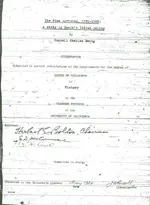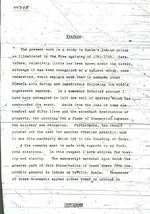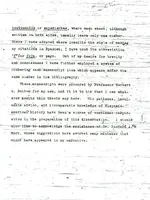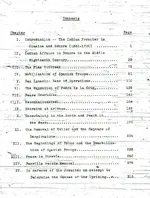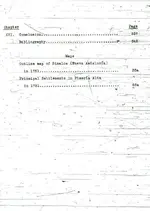Hola amigos,
This is a very long reply, so I must beg your indulgence; some of what is posted has been used in other threads here, but I am including it for the purpose of showing that the Jesuit priests were probably not just the 'good shepherds' taking care of the flock.
Cactusjumper wrote
Roy and Mike,
"For someone who has so much of Jesuit history in the southwest US, it is a bit surprising that you have missed some of the darker side of their record."
It's interesting to see people from 2010 judging the "dark side" of people who lived in Northern Mexico in 1751. It's a well know fact that the Spaniards of the New World felt the Jesuits treated the Indians much to kindly. The "protection" of their charges was a major point of friction between Spanish officials, mine owners, ranchers and the Jesuit Missionaries.
I have never "missed" the "darker side" of Jesuit history. It's just that I try to judge it in the surroundings of its time, rather from the perspective of a treasure hunter trying to shoehorn the priests into evil slave masters, working and beating their people into an early grave in secret mines.
When you consider the cruelties that the Spanish inflicted on the native populations of the New World, and the tortures that the natives inflicted on the Spanish.......as well as each other, I would say the Jesuits were the girlie men of their time.
First, don't forget, one of the leading protagonists of the Pima revolt, actually fled TO THE SPANIARDS to get AWAY from the padres, and complained that even here he was not safe from the wrath of the Jesuits. This is documented testimony, so I have strong doubts this was said just to have any kind of an excuse for killing Spaniards. More probably, the truth is between the two versions - Luis Oacpagigua likely had acted arrogantly etc and Keller (and other Jesuits) had also treated the Indios with some brutal punishments, a bit heavy-handed. The colonial governor did pardon the Indians whom had blamed the Jesuits for mistreatment, which would be odd and politically dangerous if it were un-true. <Captain Luis O went to Spanish prison, and one was executed {
Pedro de la Cruz "Chihuahua"} but most Indians were pardoned.> Father Nentvig was also NOT the only padre who was given advance warning;
"
The uprising began in the villages to the west from where it passed to these of the north. Of these, the first to riot was the village of Tubac, where they intended to kill Juan de Figueroa. News of the insurrection passed from Tubac to San Xavier del Bac where I was governor and where the natives of the mission were stirred up mainly by the man who was captain at that time and another Indian who is now imprisoned at Tubac for being an hechicero (witch doctor). These conspired and agitated to kill Father Francisco Pauer but the people did not do it because of my pleas and supplications. I quickly informed the Father of the danger, asking him to avoid disaster by fleeing the village. The father promptly left with two other Spaniards on horses I provided. I went with him six or seven leagues and when I felt he was safe I returned to my village. There the people were burning the Father’s house and the church, or ramada, where Mass was said. It had not been furnished up to now. They were also doing other mischief with the pack animals and cattle of the mission and they killed some sheep which the Father had given me. After committing these crimes most of the people went to join up with the other rebels. However, my band and I, along with some others, although we left the village and fled to the mountain, we never joined the rebels."
Cristóbal, Governor of San Xavier, October 19, 1754
(AGI, Guadalajara 419, 3m-12, page 23)
The villages in which the hostilities, burnings, and killings were committed are Sáric, where Captain General Luis is a native, Tubutama, Santa Teresa, Oquitoa, Átil, Pitiquito, Caborca, Bisani, San Miguel de Sonoitac, Busani, Aquimuri, Arizona, and Arivaca. In these villages, as well as the Realito de Oquitoa, a few more than one hundred persons of both sexes and all ages are counted dead. Among these the said Comisario Cristóbal Yañes, Romero, and Nava perished. The Reverend Fathers Tomás Tello and Enrique Ruhen, missionaries of Caborca and San Miguel de Sonoitac, also died. All of these fatalities took place on the twentieth and twenty-first of last month. Santos Antonio de Otero, San Ignacio, December 10, 1751
(AGI, Guadalajara 419, 3m-36, pages 29-30)
My Beloved Father Visitor, Felipe Segesser:
I am sure Your Reverence has already learned from other sources of the uprising in this Pimería, but I will give you the details of its condition. On Sunday the twenty-first of this month at sunrise, the Pimas struck at the house and church of Tubutama -- that is to say, Captain Luis and his sergeant, the instigators of this uprising, with those of Tubutama. Because Father Juan had gotten word of the uprising at midnight, he borrowed a donkey and stole away secretly to Tubutama where he joined the Father [Sedelmayr] and two wounded soldiers, some four residents, and the mayordomo. The insurgents burned the house and the church. The Fathers and vecinos fortified themselves in the patio with a barricade of pack saddles and fought until Tuesday night when the two Fathers and two vecinos escaped on foot to the mountain. There a friendly Indian from Magdalena loaned them a horse and guided them on a circuitous route. Father Jacobo arrived at Santa Ana on Wednesday night, wounded by three arrows. Padre Juan, alone and on foot, got lost and strayed way off the route, but they found him yesterday afternoon. They also brought him to Santa Ana to a house where the other vecinos had gathered. The residents from San Lorenzo gathered at San Ignacio. Now we wait by the hour for the appearance of the enemy.
The rebels burned Caborca at the same time and killed the Father and those who were with him, as well as others who were in the mines and mining camps. At the same time they killed a lot of people in Oquitoa, Sáric, Arivaca, Tubac, etc., and burned whatever churches there were. Father Enrique and his mayordomo and a servant are all dead, and thus is the account of everyone. All of the Papagos have joined with Luis. I convened a general meeting on Sunday night on instruction from a servant of the Father Visitor. I called one of my officials at night and told him not to frighten these people, but to go. He left and with hardship went to the village. They resolved in their meeting that all those who could (which amounted to a few criollos of the village and all of those from Ímuris) should leave. Casimiro Ureño set out for Ures, notifying those of Cucurpe and Toape of the uprising. They have stopped at Toape and are waiting for me but I am afraid to leave. The insurgents have also stolen some things from the Yaquis who fled, but the Pimas have done nothing to the Yaquis and one of them is with Captain Luis north of Guevavi. All the people of Santa María have left for good, although some did return. Those from Cocóspera still remain peaceful. At San Xavier there were seventeen men who got the Father out alive.
The political authorities have made various requests of the Lord Governor, none of which have been filled yet. I do not know who was sent away from Terrenate but at Fronteras the people have all gone. If the Indians should attack here we are in grave danger of losing everyone. As your life endures, Your Reverence, will you insist that the governor send as much help as he can promptly to take back what we have lost and strike the rebels with a decisive blow. Right now, the people here cannot set foot outside of their houses because of the great fear. And there are very few gente de razón to defend the Fathers in the north. Indeed, they already killed Julian near Guevavi, as I wrote from here yesterday -- Friday. On Saturday, however, knowledge was gained that those who were separated from Captain Luis went with their chief to the mountain called the Cerro del Chile, saying that the Spaniards were coming to destroy them. The Spanish captains are in Janos for a time and, thus, we cannot hope for any help from that quarter. In my letters I have not asked for anything else from Your Reverence, or the Father Visitor, or his resources. By my calculations, eighty-two vecinos have already died and I do not know what has happened in the north. I have frankly been working under cover for Father Salvador (de la Peña). I am committed to Holy Sacrifice for Your Reverence and ask God to keep you many years.San Ignacio, November 27, 1751
From Your Reverence’s minor servant in Christ, Gaspar Stiger
Gaspar Stiger to Felipe Segesser, San Ignacio, November 27, 1751
(AGI, Guadalajara 419, 3m-48, pages 43-45)
I realize that we have covered a lot of this before, but is it not apparent, that the padres were specifically a main target of the angry Pimas, along with their churches? The fact that so many padres escaped destruction is due to the efforts of the friendly Pimas whom were clearly in the minority! I also put that passage in bold about the mines and mining camps, hint hint.
 I am not the cause of the rebellion. Those who have caused it are Fathers Jacobo Sedelmayr, Ignacio Xavier Keller, and Joseph Garrucho, because of the severity with which they and their mayordomos treat the Indians. They have also infuriated and aggrieved the Captain General of the Nation, Don Luis. He left his village in the month of September with many armed Indians to make a campaign against the Apaches. He was to go in company with the Captain of Terrenate, Don Santiago Ruiz de Ael, but when he arrived at Santa María Suamca he was informed that the said Captain, Don Santiago, had already left his presidio. The Captain, Don Luis, then went to see Father Ignacio Keller, minister of the said village, to wish him good day and to learn the route he should take in order to most quickly catch up with the said Captain of Terrenate.
I am not the cause of the rebellion. Those who have caused it are Fathers Jacobo Sedelmayr, Ignacio Xavier Keller, and Joseph Garrucho, because of the severity with which they and their mayordomos treat the Indians. They have also infuriated and aggrieved the Captain General of the Nation, Don Luis. He left his village in the month of September with many armed Indians to make a campaign against the Apaches. He was to go in company with the Captain of Terrenate, Don Santiago Ruiz de Ael, but when he arrived at Santa María Suamca he was informed that the said Captain, Don Santiago, had already left his presidio. The Captain, Don Luis, then went to see Father Ignacio Keller, minister of the said village, to wish him good day and to learn the route he should take in order to most quickly catch up with the said Captain of Terrenate.
With no more having been said than that, the Father gave the following response: "You are a dog to come here and ask me that. You can go wherever you want, or not go at all. It would be better if you remained behind. You act like you are trying to be a Spaniard by the arms you are carrying. You are not worthy to go about in this manner. You should be in a breechcloth with bow and arrows like a Chichemeco, and without a servant (because he had in his company an Indian Servant).
And so he went away with his companions. This captain says the Father must have been drunk, because he drinks a lot. From there he returned to his village of Sáric, very sad and disconsolate because of the mistreatment he had received from the said Father Keller and the disdain with which he was treated.
Telling me of this occurrence, he said to me, “Brother, I am possessed with this evil of serving in this charge that was conferred upon me by the Father Visitor and confirmed by the Lord Governor in the name of the King. I accepted it in order to be Captain General of my nation and because the Fathers could not now scorn me in any way, since they would have to do as the King commanded. But because the Fathers detest us we are already lost. So, don’t say anything to me now about how we should love the laws of God. It is better that we should live with our liberty. Already, I do not want these arms or this uniform. Now I will betray all the Spaniards.”
In effect, this is what he did. Afterwards I went to the village of Guevavi on the occasion of the fiesta that is celebrated in honor of Señor San Miguel Arcángel. I arrived at the house of Father Minister, Joseph Garrucho, carrying the bastón (cane) of the sergeant of Captain Don Luis. So, he bid me enter his presence where he spoke very indignantly to me in front of many people, saying when I was there, “You are a dog because you are carrying that bastón. Don’t come here disturbing the people. If it was not for the day that this is, I would have you given a hundred lashes with a whipping stick.”
After saying this he snatched the bastón from my hand and commanded me to leave the village, saying that if I ever returned or if he even heard of me setting foot in the village, he would have his justicia administer a hundred lashes in his presence.
To this I said, grasping the title which I carried on my chest, “My Father, I carry this bastón by virtue of this title of sergeant, granted to me by the Lord Governor, that I might assist my brother, Captain Don Luis.”
But he responded even more angrily, saying, “I do not want to see that title. The Governor cannot grant titles without license from the Fathers. We have a cédula from the King concerning that very thing.”
The Father kept my bastón and I went away very sadly and afflicted to the village of Sáric and said to Captain Don Luis, “Brother, I am no longer your sergeant,” recounting what had happened with Father Garrucho.
To this the said Captain replied, “I was possessed of this evil but now I have taken the demon into my body. Now, if we do not finish our work we will lose everything.” Then in the presence of three or four Indians (whose names I do not remember, except one who was called Cipriano), the execution of the uprising was discussed in consultation. The said Captain asserted that one day the Indians would strike in all places, killing Fathers Jacobo Sedelmayr, Ignacio Xavier Keller, and Joseph Garrucho because these were the greatest offenders. Sometime after this consultation it happened that Father Jacobo Sedelmayr wrote a letter to Father Juan Nentvig, minister of Sáric, telling him that he should punish me and not to allow me into the village until it could be said that I was subdued. The reason I was not subdued is because of the animosity the Fathers had for me because I was the sergeant of Captain Don Luis, and because I was so persecuted by them. So because of this and because the fires of rebellion were getting very hot, I decided to leave the village and went to live among the Spaniards.
With this purpose I went to the ranch of Don Bernardo de Urrea to look for my horses, and then I returned to get my children with whom I went to Agua Caliente. Even then I was not safe from the persecution of the Fathers, because Lieutenant Don Cristóbal Yañez told me, “You must leave here because I have a letter from Father Jacobo Sedelmayr instructing me to give you fifty lashes and banish you from these parts.” I then went to the San Luis Valley to live with my foster parents, the Romeros. However, the truth is, when I said good-bye to Captain Don Luis, he told me, “Go, Brother. Take your children because the Fathers are after you. Stay in the SanLuisValley among the Spaniards, observing the forces that they have so that you can provide me with information about them when the time is right. I will secretly notify you of that proper time through a relative, to the end that you can come join us in Tubac. I will wait for you there.”
However, I did not go there, nor did he send for me to come. And I did not have intention of going there because I wanted to stay among the Spaniards -- and this is the truth. Before the time referred to is when the Indians were rigorously harassed by the way the Father and the mayordomos treated them. They had not resolved to rebel until the said quarrels transpired. They were also irritated because Juan María Romero, Father Joseph Garrucho’s mayordomo, and Joseph de Nava seized some Indians and were taking them to the village of Arivaca to turn them over to Padre Garrucho to punish them. One of the Indians, a relative of Captain Don Luis, seeing that one of those to be punished was his son, shot an arrow at Juan María Romero, wounding him in the arm. Although it was not a serious wound, they lanced the Indian and turned the others over to Padre Garrucho to punish them further. And, the Father also chastised them.
All of this I declare: since the Fathers have not always been friendly, and since he was the only one who could remedy everything, to tell you the truth, Sir, I boldly spoke to the aforementioned Captain and said, “Brother, we must all meet together and go see the Lord Governor.”
To this he responded, “I have already seen that the Lord Governor loves us very much, Brother, and for him I am sorry, but we must say, ‘Sir, we have had enough!’ because I am outraged.
Pedro de la Cruz Chihuahua, Santa María Suamca, November 29, 1751
(AGI, Guadalajara 419, Francisco Padilla Testimony, 3m-55, pages 28-35)
There is no need to "shoehorn" the Jesuits into what they did, what bothers me is the MODERN efforts to deny and erase those darker blotches. Why would a rebel Pima flee TO the evil enslaving brutal Spaniards, if the Jesuits had been the gentle 'girlie men' of the scenario? That simply won't make sense, and it is not only in the 1751 revolt that we find this apparent paradox. The Jesuits of South America made a number of complaints about their Indians running away from the reducions TO the Spanish mines where they learn every vice and sin etc and cannot be induced to return, even when promised a gold mine if they will. The Jesuits have much more strange history (as in politics) than any other Catholic or Protestant group - none have the record of being expelled from so many countries on so many occasions, of being officially ordered to be suppressed, etc as well as being implicated in some of the darkest conspiracies. The Jesuits were the largest slave-owners in Maryland at one time, and were found to have quite a number of slaves when expelled from Louisiana by the French. The image of the kindly gentleman-priest may well be accurate for SOME Jesuits, but will hardly fit them as a whole. There was a reason why the Pimas
specifically targeted the Jesuit churches and homes of the padres, and not just the Spaniards.
We will likely never agree on this whole issue amigo, for what I get from the various sources is apparently quite different from what you are getting from the very same sources. That is okay however, at least until someone appears on CNN TV with a newly-found Jesuit treasure which would seal the dispute.
Good luck and good hunting amigos, I hope you all find the treasures that you seek.
Oroblanco



 There are any numbers of "possibilities" for how miners could have been supplied. The chain of way stations that has been mentioned here for moving all of the gold and silver out of Pimeria Alta being one. I addressed a specific comment that was made about Tumacacori here earlier.
There are any numbers of "possibilities" for how miners could have been supplied. The chain of way stations that has been mentioned here for moving all of the gold and silver out of Pimeria Alta being one. I addressed a specific comment that was made about Tumacacori here earlier.


